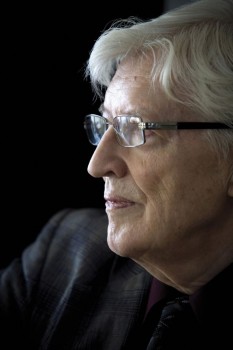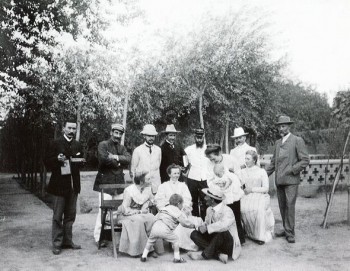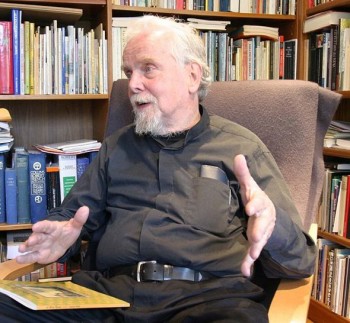Search results for "Lassi Nummi"
In the wars
31 March 2005 | Archives online, Fiction, Prose
A short story from Jussi ja Lassi (‘Jussi and Lassi’, WSOY, 1921). Introduction by Pekka Tarkka
One winter evening, Lassi, who was six, asked: ‘Can’t we go out, mother?’
‘It’s late already,’ she said.
‘We’ve been inside the whole day practically,’ said Jussi, who was seven. ‘It gets on my nerves.’
‘Gets on your nerves, does it? Well, boys, you’ll soon be off in bed,’ she said, ‘so you won’t need to get nervy.’
‘Not off to bed – not yet, it’s not yet, not…’ Lassi broke off, trying to work it out.
‘It’s not six yet,’ Jussi said.
‘No, it isn’t,’ their mother said; ‘but you’ll have to stay in your room and not go charging about here, because visitors are coming.’ More…
Incident at Experience Farm
30 September 1998 | Archives online, Fiction, Prose
A short story from Pakkasyön odottaja (‘Waiting for a frosty night’, WSOY, 1997). Introduction by Jukka Petäjä
I
The round steel teapot is new. Father brought it back from Birmingham, where he went on a visit with the others from the concrete factory. In the shop, the teapot was wrapped in rustling, soft tissue paper. Pirjo was given the honour of opening the package. The pot has been used for brewing tea ever since.
At school, her sister Karoliina is proud of the fact that at home they drink only tea; they are different from other people, different in a good way, one to be proud of. They have a real teapot. Sometimes, during breaktime, a morsel of the excellence of Karoliina Kamppinen falls Pirjo’s way. ‘Yes, let’s include her, she’s Karoliina’s sister, after all.’ More…
Markus Nummi: Karkkipäivä [Candy day]
26 November 2010 | Mini reviews, Reviews
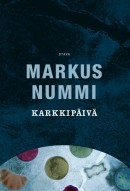 Karkkipäivä
Karkkipäivä
[Candy day]
Helsinki: Otava, 2010. 383 p.
ISBN 978-951-1-24574-2
€28, hardback
Like this one, Markus Nummi’s previous novel, Kiinalainen puutarha (‘Chinese garden’, 2004), set in Asia at the turn of the 20th century, involves a child’s perspective. Karkkipäivä‘s main theme, however, is a portrait of contemporary Finland. Tomi is a little boy whose alcoholic parents are incapable of looking after him; Mirja’s mother is a frantic workaholic heading for a nervous breakdown. She is a control freak who secretly gorges on chocolate at work and beats her little daughter – a grotesque portrait of contemporary womanhood. Tomi manages to get some adult attention and help from a writer; the relation between them gradually builds into one of trust. Katri is a social worker, empathetic but virtually helpless as part of the social services bureaucracy. Virtually every adult suspects others of lying, finding each other’s motives doubtful. Nummi (born 1959) has structured Karkkipäivä with great skill; the ending, in which matters are resolved almost by chance, is particularly gripping. This novel was nominated for the 2010 Finlandia Prize for Fiction.
Lassi Saressalo: Pois Suomesta [Out of Finland]
12 July 2010 | Mini reviews, Reviews
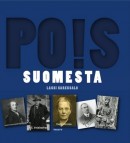 Pois Suomesta – Suomesta paenneita, karkotettuja, väkisin vietyjä, laittomasti lähteneitä
Pois Suomesta – Suomesta paenneita, karkotettuja, väkisin vietyjä, laittomasti lähteneitä
[Out of Finland – refugees, deportees, abductees, illegal emigrants]
Tampere, Traff Kustannus, 2010. 297 p.
ISBN 978-952-99079-7-7
€ 29, hardback
Dr Lassi Saressalo, head of the Finnish Local Heritage Federation, has gathered a large collection of stories about people who were deported or abducted from Finland, or who fled as refugees. The examples relate to several periods of Finland’s history, including Swedish and Russian rule and the period since independence in 1918. People have had to leave Finland at different times for different reasons: some fled the cruelty of conquerors or conscription, others were forced to leave because of their political views or patriotic aims, either on their own initiative or by the government. The most recent cases discussed in the book date from the period following the end of the Second World War. The book is accompanied by a (Finnish-language) website, which provides additional background information on the events that are described as well as a forum for discussion.
Older and wiser?
9 October 2012 | This 'n' that
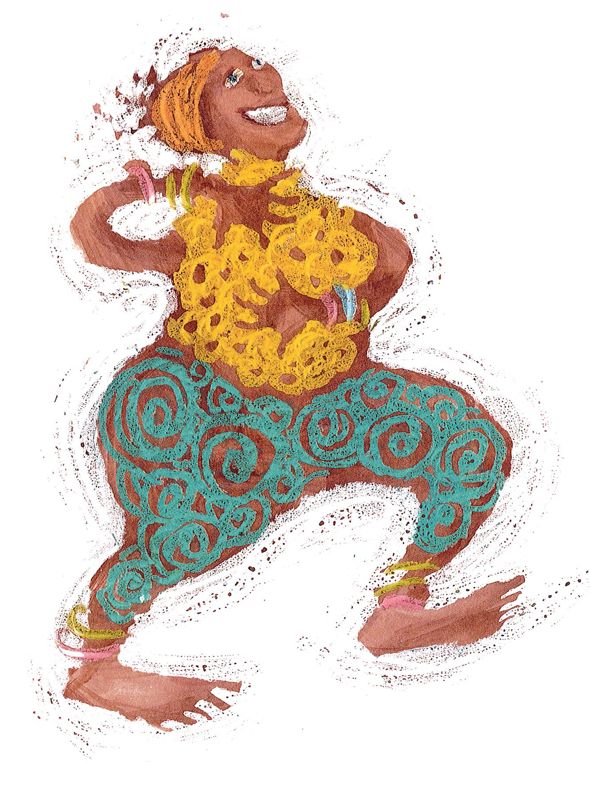
Illustration: Virpi Talvitie (from Täyttä päätä. Runoja ikääntyville, ‘Full steam ahead. Poems for ageing people’, edited by Tuula Korolainen and Riitta Tulusto)
Nobody can claim that old age is hot, or media-sexy. Yes, but what are older people really like? Are they the bingo-obsessed grannies in floral frocks or old geezers living in the past of popular opinion?
No longer. In just a few years the baby-boom generation will be entering their seventies, when ‘old age’, in its current Western definition, begins. (Until then, senior citizens are allowed to remain ‘adults’.)
Are the old people’s homes ready for them? This new elderly generation will be wanting to listen to Elvis, the Rolling Stones and the Beatles rather than the tango. More…
Literary glory and basketball
23 November 2012 | This 'n' that
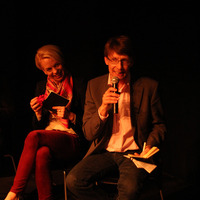
Fights with words: Baba Lybeck and Markus Nummi. Photo: Literary Death Match
Fans of new writing and competitive reading out loud converged on Korjaamo in Helsinki on October 25th for the second Finnish ‘episode’ of Literary Death Match. LDM (as it’s known to regulars) is a series of events created in the USA and hosted by Adrian Todd Zuniga in which authors perform live readings of their recent work and receive critical assessments from a panel of judges in a manner familiar to viewers of trashy TV talent shows.
The winners of the evening’s initial reading rounds advance to the final, where the ultimate victor is decided in a game show-style battle involving skills that are perhaps more tangential to the work of most authors.
In his shiny jacket, LDM co-founder Adrian Todd Zuniga certainly looked the part of the cheesy game show host. He was an enthusiastic compère and got the bilingual evening under way by introducing the panel of judges. Author Markus Nummi was to be responsible for assessing the competitors on literary merit, while Baba Lybeck, a radio journalist and host of Uutisvuoto (the Finnish TV version of the BBC’s topical panel show Have I Got News for You), would be awarding points for performance. The third member of the panel was journalist and author Ari Lahdenmäki, who was assigned the category of ‘Intangibles’, i.e. anything that didn’t fall under the other two headings. More…
Runeberg Prize 2013 for poetry
8 February 2013 | In the news

Olli-Pekka Tennilä. Photo: Aleksis Salusjärvi, 2012
The Runeberg Prize for fiction, awarded on 5 February, this year for the twenty-seventh time, went to a book of poetry by Olli-Pekka Tennilä (born 1978).
Tennilä’s second work, Yksinkeltainen on kaksinkeltaista (‘Doubly simple’, a pun: yksinkertainen = simple, kaksinkertainen = double, keltainen = yellow), published by Poesia, makes use of a child’s open-minded use of language and studies the world of the bees. Tennilä is one of the founding members of Osuuskunta Poesia, a poetry cooperative, and is currently its publishing director.
The prize, worth €10,000, was awarded on 5 February – the birthday of the poet J.L Runeberg (1804–1877) – in the southern Finnish city of Porvoo.
The jury, writer Tommi Melender, critic Siru Kainulainen and theatre manager Dan Henriksson – representing the prize’s founders, the Uusimaa newspaper, the city of Porvoo, both the Finnish and Finland-Swedish writers’ associations and the Finnish Critics’ Association – chose the winner from a shortlist of eight books. In their opinion the winning work is both ‘a structurally controlled and expressively vital whole; it demonstrates how the linguistic logic of a small child can be employed again as an adult.’
The other seven finalists were a book of essays, Toinen jalka maassa ja muita esseitä (‘One foot on the ground and other essays’, WSOY) by Markku Envall, two poetry collections, Keisarin tie (‘The emperor’s road’, Otava) by Lassi Hyvärinen and Kuolinsiivous (‘Death cleaning’, WSOY) by Eeva Kilpi, two collections of short stories, Kadonnut ranta (‘Lost shore’, WSOY) by Tiina Laitila Kälvemark and Till dig som saknas (‘To you who are missing’, Schildts&Söderströms) by Peter Sandström, as well as two novels, Rikosromaani (‘Crime novel’, Otava) by Petri Tamminen and Neuromaani (‘Neuromane’, Otava) by Jaakko Yli-Juonikas.
Paris match
30 June 2011 | Articles, Non-fiction
In 1889 the author and journalist Juhani Aho (1861–1921) went to Paris on a Finnish government writing bursary. In the cafés and in his apartment near Montmartre he began a novella, Yksin (‘Alone’), the showpiece for his study year. Jyrki Nummi introduces this classic text and takes a look at the international career of a writer from the far north
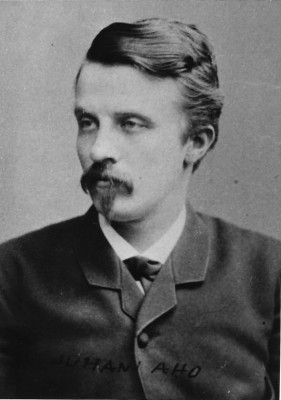
Juhani Aho. Photo: SKS/Literary archives
Yksin is the tale of a fashionable, no-longer-young ‘decadent’, alienated from his bourgeois circle, and with his aesthetic stances and social duties in crisis. He flees from his disappointments and heartbreaks to Paris, the foremost metropolis at the end of the 19th century, where solitude could be experienced in the modern manner – among crowds of people. Yksin is the first portrayal of modern city life in the newly emerging Finnish prose, unique in its time.
Aho’s story has parallels in the contemporary European literature: Karl-Joris Huysmans’s A Rebours (1884), Knut Hamsun’s Hunger (1890) and Oscar Wilde’s The Portrait of Dorian Gray (1890). More…
Finland(ia) of the present day
2 December 2010 | In the news

Mikko Rimminen. Photo: Heini Lehväslaiho
The Finlandia Prize for Fiction 2010, worth €30,000, was awarded on 2 December to Mikko Rimminen (born 1975) ; his novel Nenäpäivä (‘Nose day’, Teos) was selected by the cultural journalist and editor Minna Joenniemi from a shortlist of six.
Appointed by the Finnish Book Foundation, the prize jury (Marianne Bargum, former publishing director of Söderströms, researcher and writer Lari Kotilainen and communications consultant Kirsi Piha) shortlisted the following novels:
Joel Haahtela: Katoamispiste (‘Vanishing point’, Otava), Markus Nummi: Karkkipäivä (‘Candy day’, Otava), Riikka Pulkkinen: Totta (‘True’, Teos), Mikko Rimminen: Nenäpäivä (‘Nose day’, Teos), Alexandra Salmela: 27 eli kuolema tekee taiteilijan (’27 or death makes an artist’, Teos) and Erik Wahlström: Flugtämjaren (in Finnish translation, Kärpäsenkesyttäjä, ‘The fly tamer’, Schildts). Here’s the FILI – Finnish Literature Exchange link to the jury’s comments.
Joenniemi noted the shortlisted books all involve problems experienced by people of different ages. How to be a consenting adult? How do adults listen to children? Contemporary society has been pushing the age limits of ‘youth’ upwards so that, for example, what used to be known as middle age now feels quite young. And, for example, in Erik Wahlström’s Flugtämjaren (now also on the shortlist for the Nordic Literature Prize 2011) the aged, paralysed 19th-century author J.L. Runeberg appears full of hatred: being revered as Finland’s national poet didn’t make him particularly noble-minded.
According to Joenniemi, Rimminen’s novel ‘takes a stand gently’ in its portrayal of contemporary life – in a city where a lonely person’s longing for human contacts takes on tragicomical proportions. Joenniemi finds Rimminen’s language ‘uniquely overflowing’. Its humour poses itself against the prevailing negative attitude, turning black into something lighter.
Rimminen has earlier published two collections of poems and two novels (Pussikaljaromaani, ‘Sixpack novel’, 2004, and Pölkky, ‘The log’, 2007) . Pussikaljaromaani has been translated into Dutch, German, Latvian, Russian and Swedish.


